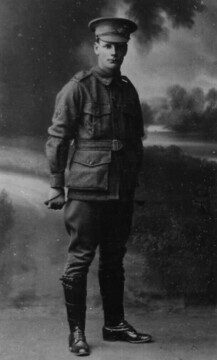
MORAN, Sydney Gordon Wolsely
| Service Number: | 4568 |
|---|---|
| Enlisted: | 30 May 1916 |
| Last Rank: | Private |
| Last Unit: | 31st Infantry Battalion |
| Born: | Glebe, New South Wales, Australia, 1890 |
| Home Town: | Texas, Goondiwindi, Queensland |
| Schooling: | Brookvale Public School, New South Wales, Australia |
| Occupation: | Factory worker |
| Died: | Killed in action, Belgium, 26 September 1917 |
| Cemetery: |
No known grave - "Known Unto God" Menin Gate Memorial, Ypres, Flanders, Belgium |
| Memorials: | Australian War Memorial Roll of Honour, Ypres (Menin Gate) Memorial |
World War 1 Service
| 30 May 1916: | Enlisted AIF WW1, Private, 4568, 31st Infantry Battalion | |
|---|---|---|
| 23 Dec 1916: | Involvement Private, 4568, 31st Infantry Battalion, Third Ypres, --- :embarkation_roll: roll_number: '16' embarkation_place: Sydney embarkation_ship: HMAT Demosthenes embarkation_ship_number: A64 public_note: '' | |
| 23 Dec 1916: | Embarked Private, 4568, 31st Infantry Battalion, HMAT Demosthenes, Sydney |
Help us honour Sydney Gordon Wolsely Moran's service by contributing information, stories, and images so that they can be preserved for future generations.
Add my storyBiography contributed by Stephen Brooks
Syd Moran worked for some years in a tobacco factory at Texas, Queensland, owned by WD & HO Wills. He was the son of William and Christina Moran, of Inglewood, Queensland.
His father, William, had enlisted in the 2nd Light Horse Field Ambulance during 1914 and had gone away with the First Contingent.
His younger brother, 2417 Pte. George Washington Moran 13th Battalion AIF, was killed in action at Stormy Trench in France on 4 February 1917, aged 24, about a month before Sydney arrived in England.
Sydney joined the 31st Battalion in Belgium on 1 August 1917 and was killed in action at Polygon Wood about 8 weeks later. He has no known grave.
Sydney’s father returned to Australia during April 1918. In a letter to Base Records the father said he had met and talked with his son about two weeks before his death.
The father had lost two sons with the AIF and believed he lost another son, William James, who had enlisted with the British Army.
In a letter to Base Records regarding Sydney’s medals, he noted, “I and my sons did all we could. The 3 of them gave their lives and I was prepared to do the same. Who could do more?”









